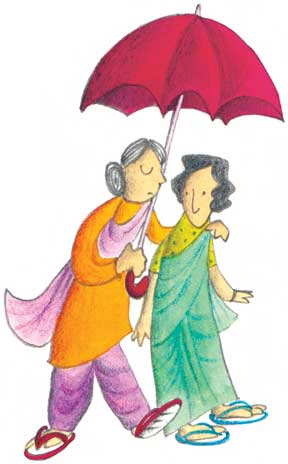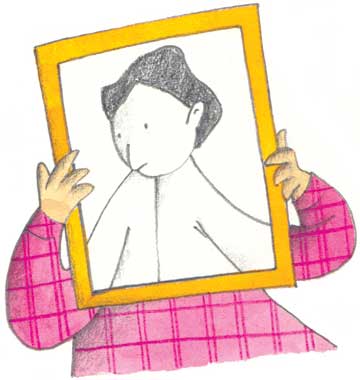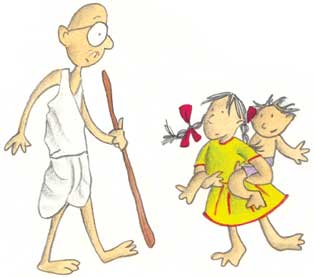Prakash Iyer
“But why aren’t you giving her ration!”
“The ration is provided only for people in the most difficult situation. Some people get it, others do not. Sorry!”
“Huh! I got ration. Which means we are poorer than them. But they do the same work we do – begaari (construction work on daily wages). Sometimes we get work, sometimes we do not. Maybe I am poorer today; but they also need rations.”
“Sorry, but we had to decide this based on the current situation. How much you have earned in the last two months, the kind of work you both do, if anyone is seriously ill. Her name is not on the list because she did some housework last three months.”
“OK! I shall tell her. I shall share some of my ration with her. We will manage somehow.”
“Are they your relatives?”
“Huh! We are neighbours!”, she said and calmly walked away.
It was a locality of thatched houses with tin sheets for walls. “Blue tent” houses they are called. The people living there were migrants from various parts of the country. Each house was 10×10, two rows of houses separated by 2-3 feet, windows did not exist, no rooms inside the house, 3 common toilets for 20 houses. But these were not mere houses, they were homes. Every one of them had a dire need for help in these days of lockdown, when not only the virus, but money, food, and other resources also refused to enter their homes.
This is where the woman unperturbedly said, she would share the free rations with her neighbour. The matter-of-fact way in which she said she would share her rations was heroism to say the least. But how does one feel alright giving away their own limited rations in a situation like this! One would expect everyone to cling to the little free rations they get from a kind patron. She cared for the rations, but she was not possessive about them. She saw food as important, nay, necessary for everyone. She saw the rations as belonging to everyone in the settlement, even though it was given only to some of them.
She did not seem to exhibit any heavy emotion like generosity, kindness, sacrifice. For her it was a matter of immediate need, for everyone. Her poverty was the same poverty as others’.

Solidarity and the limits of empathy
They were an economically disadvantaged and marginalized people locked up in their blue tent settlement. Others from outside had to bear the responsibility of further classifying them as poor, not-so-poor, manageably-poor, extremely poor…and decide who deserved rations and who did not. For the lady, this was a source of food coming from somewhere, which should provide for everyone in the settlement.
During good times it is relatively easy to say, “We are all one.” or “I would give my life for the nation,” and really mean it. But in difficult times – when food and basic needs are under question, when lives are in jeopardy – a sense of solidarity, and fraternity are more difficult to feel than otherwise. By voluntarily deciding to share her rations with a neighbour she did not know well, she demonstrated a sense of solidarity. Her troubles were as serious as the neighbour’s. She could have insisted that rations be given to the other home too, but she did not. Instead she just decided to give part of her own rations.
Why would she make such a huge sacrifice so casually? She was doing this just because she felt it would be wrong not to do this. She felt obligated to do this. The obligation comes from within, from having a sense of being one with the community. Not for any external reasons like plea, begging, coercion or any social norm.
In a nation that avows democracy, we are often put in situations when we are expected to make similar sacrifices – when we vote, when we support or oppose policy decisions which would have a huge impact on some people we don’t know personally. At such times we are challenged by the need to sacrifice benefits we might get from a policy, for the sake of the larger good – others’ good. That includes people we have never met, not known how it is to live the way they have to. This challenges the feeling of empathy, because we may not have similar experiences in our lives. It would be hard, almost impossible, for most of us to imagine what it is to live on daily wages when tomorrow’s meals depend on todays’ earnings. How do we feel the kind of obligation that she felt towards her neighbour?
Two sources of obligation
In this situation, because of the pandemic and associated lockdown, a desirable systemic inequality is being introduced by the state and by philanthropists. It is inequality because only some people receive the benefit of a ration kit, others do not. How would one create a sense of obligation to approve of and even nurture this inequality?

One way is to value and employ neutrality. Rawls (American moral and political philosopher) recommends we do this with the help of a thought experiment, which he calls the original position. We imagine there is no system of distribution. We temporarily ignore our social and economic position in society, and also the identity of particular people involved in the situation. He says, we should imagine ourselves and many others as human beings who we don’t know anything about. Then we classify humans based on the current circumstances – some people are disadvantaged by their financial situation and others are not, some are capable of fending for themselves and others are not. The need to forgo our identity temporarily is required because we might carry biases towards some people, our family, friends, relatives or people of our own community, our religion…human beings are complex and we carry many values that even we are sometimes ignorant of. Therefore Rawls says we should put on a ‘veil of ignorance’ so that when we determine criteria for who should be treated as more equal, we should not be influenced by our biases.
The criteria will then make us feel morally obliged to consider some individuals deserving of the benefits coming from inequality – in this case the woman’s neighbour. According to Rawls, the ‘veil of ignorance’ helps us become objective, and we will see all citizens including ourselves as being bound by “terms of social cooperation”. As we are all citizens of the same nation, we have to care for everyone else as citizens of the same nation, bound by one constitution. We also need to know that if we were in that situation, others would think the same way about this inequality.
But this is a cognitively complex exercise to do. Moreover this is purely cognitive, as if humans are influenced by their intellect alone. This view seems to ignore emotions and feelings that are normally stronger influencers of moral actions. We teachers would know this if we imagine teaching our students this idea and expect them to think in this manner for the rest of their lives.

There is an opposite view that eschews the need for neutrality simply because we are worried about differences and associated biases. This view – advocated by Gandhi, and many theorists these days – says we should not adopt a veil of ignorance because that would make it a cognitive exercise that does not by itself help us decide what to do. We need to feel for the other person, and so we should identify them as our own – as part of the India we are part of. This would create a feeling of oneness that we should feel towards all citizens of our nation. This feeling of oneness amounts to seeing ourselves as morally bound to our nation. If we feel bound to our nation, we would consider our co-citizens as similar to us. We would not see the differences of class, religion or anything else. It would hurt us to see people in trouble, and we would want to do all we can to the extent possible for us.
The lady was concerned enough that she asked the volunteer why her neighbour was not getting rations. When she came to know why, she continued to feel strongly for her neighbour and decided to share her own rations with her. For her that was all she had to do. With no thought experiment, no questions on criteria used by the volunteer, she was just focused on the end result, and she did what she could do – give her neighbour part of her own rations.
This stance is often equated to a “religious” attitude towards your nation and your co-citizens. When used as an adjective, the word religious merely means the feeling should be as strong as if nationalism were religion for us. We don’t think twice but just accept the feeling, and do what is required at that point in time.
Good partiality to teach solidarity
This feeling of national solidarity is obviously a result of socialization, not formal education that adopting the veil of ignorance would require. It would not be taught with a textbook. It would have to be taught through the nature of the school environment and culture. We teachers ought to respond to particular acts of selfishness, partiality or bias based on factors other than the general notion that we are all part of one community.
This would require inculcating a sense of humility, by being humble ourselves. We have to allow for inequalities of a favourable kind in our schools, in our classes. When we spend more time with a child who is finding it difficult to learn, and less with another who is able to learn by herself, we are subtly teaching them the virtues of sacrifice. When learning is in question, we teachers have to demonstrate the appreciation that different children require different amounts of time to learn. When we do so, we teach children to appreciate that everyone is not equal, and so treating everyone equally is not always right. Partiality is sometimes morally defensible. Gradually one learns good partiality from bad – for themselves and for others.
The lady reminded me of a happening I have heard from a close friend. Once when Gandhi visited Bangalore, he was walking towards the dais to speak to a large crowd. Hundreds of people stood on both sides of the path he was walking along. He happened to see a 7-8 year-old-girl carrying a small child. Gandhi stopped and said, “He must be heavy.” The girl said, “He is my brother!”*
He was not a burden, he was not heavy or light. He was her brother!
References
• “Justice as fairness” by John Rawls.
*My colleague, Narayana Gatty shared this story of Gandhi’s visit to Bangalore in a workshop when he was teaching the value of Fraternity.
The author teaches Philosophy of Education at Azim Premji University. He can be reached at prakash.iyer@apu.edu.in.
